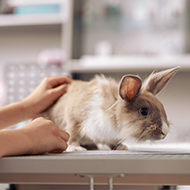Experts raise awareness of rabbit GDV

Vets are being encouraged to use CT for the rapid diagnosis and targeted treatment of GDV.
Veterinary surgeons are being reminded about the potential for delayed or misdiagnosis of acute abdominal conditions in rabbits, such as gastric dilation and volvulus (GDV).
The reminder from VetCT and Exotics Vet Support comes after a recent case in a seven-year-old rabbit that was presented for anorexia and had not passed faeces for more than 12 hours.
Dr Dean Felkler, founder and CEO of Exotic Vet Support, said: “A full diagnostic investigation was performed. From the radiographs, it is difficult to appreciate the GDV. However, on the CT scan, reported by VetCT, it was very obvious when compared to the normal stomach orientation.”
After initial stabilisation, the rabbit had surgery for an incisional gastropexy to reorientate the stomach. Within 24 hours of surgery, the rabbit had recovered well and was eating and passing faeces.
In light of this, vets are being encouraged to use CT for the rapid diagnosis and targeted treatment of GDV to improve outcomes. CT is being increasingly recognised for early, accurate diagnosis of pathology in rabbits, including conditions such as GDV, appendicitis and rhinitis.
Dr David Reese, director of VetCT Australia and exotics expert commented: “We are able to identify several life-threatening pathologies much more accurately with CT than radiographs. This is vital for early correction of acute surgical abdominal conditions to increase the likelihood of a positive outcome.”



 The latest
The latest